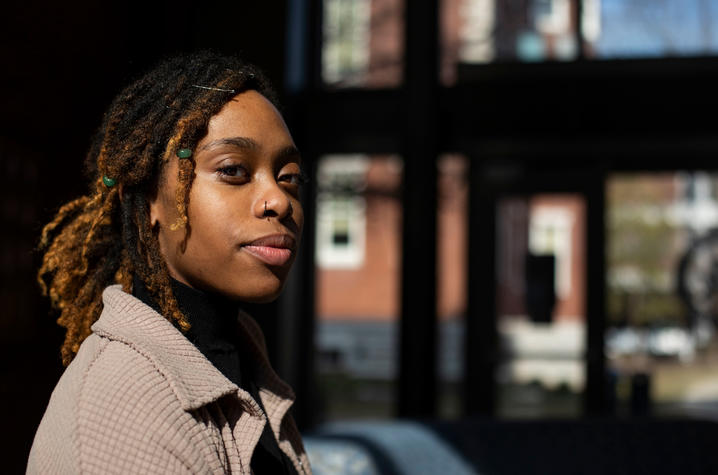How UK Senior Savannah Lewis is Changing the Face of Engineering

“What do you want to be when you grow up?”
As children, we rarely have a good answer for the adults who ask us that question.
As a young girl navigating small-town life in Thomson, Georgia, Savannah Lewis certainly didn’t have the answer. But she always had a strong interest in math and science — more specifically, a fascination with electricity and astronomy.
Lewis often wondered, “how can I channel that passion into purpose?”
“Because there are hardly any Black engineers in society, it’s more difficult for Black kids to see that as a possibility for themselves,” she said. “There are kids that have no idea what they are passionate about, because they don’t have the resources available to be exposed to it.”
Lewis lacked role models in STEM fields, so she didn’t quite understand the magnitude of their importance. But she did have two sources of inspiration — two influential people who taught her the power of perseverance.
“When I was in middle school, my parents went back to school to earn their associate degrees,” Lewis continued. “That really inspired me, because my parents didn’t put an expiration date on their dreams.”
So, she decided to chase hers.
Lewis dedicated herself in school, and when it came time to decide where to continue her education, she wanted a place that would foster her wildest ambitions — to become an astronaut.
That’s when the University of Kentucky came knocking.
“Initially, UK wasn’t on my radar, but I received a free application and decided to apply. A few months later, I received some scholarship opportunities, which drew my attention back to the university,” she explained. “After looking into the engineering program, I felt as though UK was the best choice.”
As a student who often excelled, Lewis was excited for this next challenge. But life away from home proved more difficult than she imagined.
“When I first got to college, it was very hard. I was seven hours away from my family with hardly any new friends,” Lewis recalled. “Not to mention, I went straight from making all A’s in high school to failing exams in college. It was very rough.”
As she struggled with finding her place and passing pre-calculus, Lewis began to question her future as an engineer.
“I did not do well and had to re-take the course. I was very discouraged that winter break because I thought, if I cannot get through this class, how will I get through the rest? I already felt that I didn’t truly belong in engineering.”
But Lewis returned to UK and precalculus her second semester — more dedicated and more determined.
“I studied for quizzes, went to tutoring and finished homework before the due dates,” she explained. “Through my hard work, I was able to come from a D to an A.”
And friendships were also starting to fall into place.
“I went to a National Society of Black Engineers (NSBE) meeting, and they have been my family away from home ever since. That sense of community is what got me through my first year of college.”
Now, Lewis is an electrical engineering senior and vice president of the NSBE student chapter.
She has reached many milestones throughout her engineering journey, from accepting a co-op position with the National Air and Space Intelligence Center to being awarded the 2020 Outstanding Junior Award from the Department of Electrical and Computer Engineering.
As the first person in her family to pursue a bachelor’s degree and study engineering, Lewis describes the feeling as daunting yet rewarding.
“Knowing that I’m helping this profession become more diverse, by increasing representation, makes me extremely proud.”
As the telecommunications chair for NSBE, Lewis runs the social media platforms and website. Through a “Member Mondays” series, students take over NSBE’s Instagram story and share their experiences.
“Knowing that Black people are succeeding and excelling despite oppression and inequality is so inspiring. Because I know what it feels like when you’re the only Black girl in your classroom or in your department,” she explained. “Engineering is not something that everyone knows about, especially if you’ve never seen it or heard of it.”
Now, when Lewis reflects on the question, “what do you want to be when you grow up,” she is steadfast in her response.
Lewis wants to apply to a space systems or aeronautical engineering master’s program following graduation in hopes of achieving her lifelong goal of becoming an astronaut.
But Lewis’ aspirations reach far beyond her own personal ambitions. She also wants to help young students realize their potential.
One day, Lewis hopes to start a STEM program for students in her hometown. The program would consist of educational field trips and college preparation. Lewis also wants to start a scholarship fund for graduating seniors at her church.
Ultimately, she believes her journey could — and should — inspire systemic change.
“I want the younger generation to know they are more than capable of obtaining a degree and having the career of their dreams,” she said. “We need to make engineering more inclusive, to bring varying perspectives and inspire generations to come.”
More from this series Research Priorities - Diversity & Inclusion
Credits
Lindsey Piercy (Public Relations & Strategic Communications)


